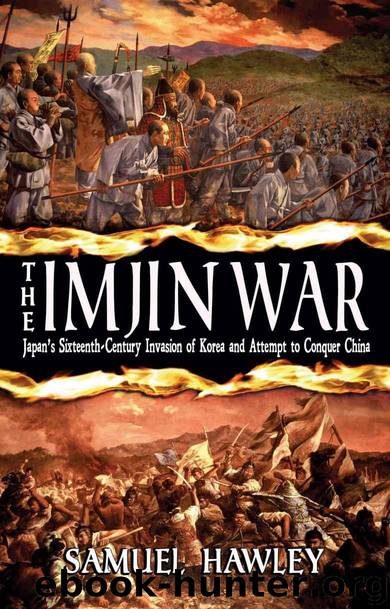The Imjin War: Japan's Sixteenth-Century Invasion of Korea and Attempt to Conquer China by Samuel Hawley

Author:Samuel Hawley
Language: eng
Format: mobi, epub
Publisher: Conquistador Press
Published: 2014-09-02T12:00:00+00:00
CHAPTER 18
Seoul Retaken
Spring—arguably the most beautiful season in Korea. After a harsh winter of ice and snow and cold north winds, the warming weather and first green shoots come as a welcome relief. Clusters of cosmos rise up long-stemmed from the earth, painting country lanes across the land in pastel shades of lavender and pink. The forsythia bloom, and the magnolia trees too, their white flowers so smooth and creamy they look good enough to eat. The farmers head back to their fields to begin another cycle of planting and promise, while yangban gentlemen look on with pen in hand from their shaded stoops, trying to encapsulate in a few choice lines the sublimity of it all.
The spring of 1593 was different. Korea was now into its second year of war, and for many of its citizens the world as they knew it had come to an end. Cities and towns lay in ruins from Pusan to Pyongyang. Families were scattered, children abandoned, the weak and the elderly left behind. Refugees, driven either by the loss of their homes or terror of the Japanese, wandered from place to place in search of food. But there was little for them to find, for fields had been abandoned throughout the land, and cultivation had almost ceased. Starvation gripped the peninsula, and soon a full-fledged famine.
The Japanese army was suffering as well. The long, cold winter, so much harsher than anything the men of Kyushu, Shikoku, and western Honshu had experienced before, had taken its toll through exposure, frostbite, and fatigue. Garrisons throughout the country were chronically short of food. Little could be sent from Japan due to the blockade of the Korean navy, while guerrilla activity made it increasingly dangerous for foraging parties to venture into the countryside in search of food. At garrisons from Pusan to Seoul, Japanese soldiers were hungry and disheartened, and wanted to go home.
The situation was nowhere worse than in the capital of Seoul, now the most northerly point on the peninsula occupied by the Japanese, connected to the south by a tenuously held corridor of territory along the main road. No fewer than 53,000 men were encamped there, no fewer than 53,000 mouths to feed. But food was running short. The situation became critical when a small unit of Chinese and Korean commandos launched a covert operation against the large warehouse complex at Yongsan, just south of the city wall on the banks of the Han River, and succeeded in burning it to the ground. The loss of grain suffered in this raid left the Japanese with food for less than a month and little choice but to commandeer grain from local citizens to keep themselves alive.[432]
In addition to the prospect of starvation, the Japanese in Seoul were also faced with a pestilence that was beginning to decimate their already depleted ranks, the spread of which was no doubt encouraged by the bloated corpses of civilians and livestock that had come to litter the streets. The
Download
The Imjin War: Japan's Sixteenth-Century Invasion of Korea and Attempt to Conquer China by Samuel Hawley.epub
This site does not store any files on its server. We only index and link to content provided by other sites. Please contact the content providers to delete copyright contents if any and email us, we'll remove relevant links or contents immediately.
| Central Asia | Southeast Asia |
| China | Hong Kong |
| India | Japan |
| Korea | Pakistan |
| Philippines | Russia |
The Sympathizer by Viet Thanh Nguyen(4385)
The Rape of Nanking by Iris Chang(4203)
World without end by Ken Follett(3474)
Ants Among Elephants by Sujatha Gidla(3462)
Blood and Sand by Alex Von Tunzelmann(3195)
Japanese Design by Patricia J. Graham(3167)
The Queen of Nothing by Holly Black(2587)
City of Djinns: a year in Delhi by William Dalrymple(2552)
Foreign Devils on the Silk Road: The Search for the Lost Treasures of Central Asia by Peter Hopkirk(2456)
India's Ancient Past by R.S. Sharma(2451)
Inglorious Empire by Shashi Tharoor(2437)
Tokyo by Rob Goss(2427)
In Order to Live: A North Korean Girl's Journey to Freedom by Yeonmi Park(2378)
Tokyo Geek's Guide: Manga, Anime, Gaming, Cosplay, Toys, Idols & More - The Ultimate Guide to Japan's Otaku Culture by Simone Gianni(2363)
India's biggest cover-up by Dhar Anuj(2350)
The Great Game: On Secret Service in High Asia by Peter Hopkirk(2341)
Goodbye Madame Butterfly(2250)
Batik by Rudolf Smend(2179)
Living Silence in Burma by Christina Fink(2068)
